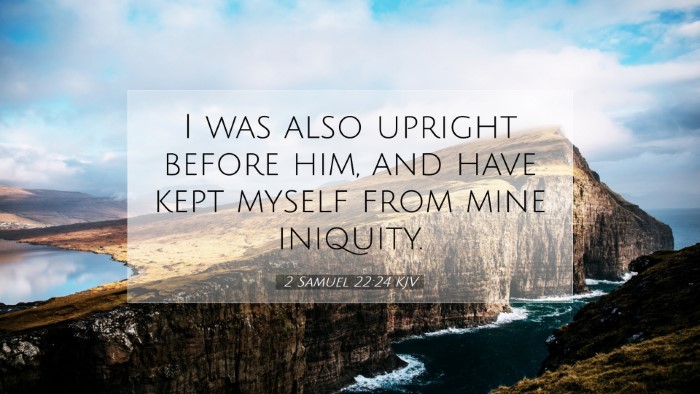2 Samuel 22:24 - Commentary Summary
Verse Context: 2 Samuel 22:24 records a declaration by David as he praises God for His deliverance and righteousness. This verse states:
"I was also upright before him, and have kept myself from mine iniquity."
Historical and Theological Insights
This verse is part of David’s song of praise after being delivered from his enemies and from the hand of Saul. It is important to note that this song celebrates God's faithfulness and protection in response to David's righteousness.
Matthew Henry Commentary
Matthew Henry describes this verse as a reflection on David's personal integrity and how it aligns with God's favor. He notes:
- Personal Accountability: David acknowledges his uprightness, suggesting a deep sense of personal accountability before God. Henry emphasizes that true humility does not shy away from recognizing the grace and righteousness that God enables in a believer’s life.
- Faithfulness amidst Trials: Henry points out that David's trials and struggles were not without purpose. His statement of keeping himself from iniquity signifies a conscious effort to remain faithful to God's commandments even when faced with adversity.
Albert Barnes Commentary
Albert Barnes offers a rich exploration of the themes of purity and integrity in this verse. He remarks:
- Uprightness before God: Barnes notes that David expresses a confident assertion of his moral state before God. This “uprightness” speaks to the integrity of heart which God seeks in His servants.
- The Nature of Iniquity: Barnes discusses how David intentionally distanced himself from sin, illustrating the importance of personal effort in resisting temptation. This aligns with biblical principles of holiness and devoted living.
Adam Clarke Commentary
Adam Clarke provides a theological perspective that enhances our understanding of this verse. His insights include:
- The Role of Divine Assistance: Clarke asserts that David’s ability to maintain uprightness should be attributed to the grace and assistance provided by God. He emphasizes that without divine support, human righteousness would be unattainable.
- Assurance in Divine Judgment: Clarke elaborates that David's claim to have preserved himself from iniquity reflects a broader theme of assurance before God’s judgment. This assurance is critical for believers as they navigate the complexities of moral life.
Theological Implications
Each of these commentaries brings to light several theological implications:
- Importance of Personal Holiness: The assertion of personal integrity is pivotal in understanding a believer’s relationship with God. It compels pastors and theologians to stress the significance of living a life that honors God’s standards.
- God’s Faithfulness to Righteousness: The connection between human righteousness and God’s faithfulness underlines the theme of biblical promise and accountability.
- Encouragement for Believers: David’s example serves as an encouragement for all believers to strive for holiness, demonstrating reliance on divine enablement rather than self-sufficiency.
Practical Applications for Pastors and Students
The lessons gleaned from this verse and the accompanying commentaries offer numerous applications:
- Encouraging Integrity: Pastors can encourage congregation members to reflect on their lives and seek God’s strength to remain upright in their dealings.
- Addressing Temptation: Teaching students about the active rejection of sin helps equip them for a faith journey that resists worldly influences.
- Modeling Righteousness: Leaders in the church should model integrity and reliance on God’s grace, illustrating the principle that righteousness is possible through divine support.
Conclusion
2 Samuel 22:24 emphasizes the critical relationship between a believer’s righteousness and God’s deliverance. Through the insights of Matthew Henry, Albert Barnes, and Adam Clarke, we see a profound encouragement to aspire towards integrity, recognizing it as both a gift from God and a personal responsibility. This verse serves not only as a historical reflection of David’s life but also as a timeless principle for spiritual living that resonates with theology, leadership, and personal faith.


